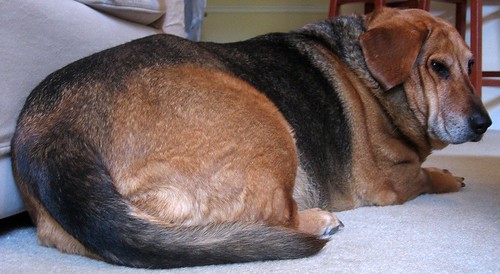 According to the free dictionary online, the definition of "banging head against a brick wall" is to keep asking someone to do something that they never do. Sometimes there are very valid reasons why someone doesn't listen to what you are asking them to do. You wouldn't go play out in traffic or jump of a cliff just because someone asked you to, right? Right. But most of the time when I am talking to clients in the exam room, I am not asking for anything so extreme. You see, I love my animals very much and I assume that everyone loves their pets as much as I do. I want my animals to live happy and healthy lives and I want that for my patients. So why do have I such a hard time convincing people to put their overweight pets on a diet? I know this isn't just a "me" problem because my friends who are vets have the same problem. But why is this a problem? That's what I am here to explore today.
According to the free dictionary online, the definition of "banging head against a brick wall" is to keep asking someone to do something that they never do. Sometimes there are very valid reasons why someone doesn't listen to what you are asking them to do. You wouldn't go play out in traffic or jump of a cliff just because someone asked you to, right? Right. But most of the time when I am talking to clients in the exam room, I am not asking for anything so extreme. You see, I love my animals very much and I assume that everyone loves their pets as much as I do. I want my animals to live happy and healthy lives and I want that for my patients. So why do have I such a hard time convincing people to put their overweight pets on a diet? I know this isn't just a "me" problem because my friends who are vets have the same problem. But why is this a problem? That's what I am here to explore today.The facts are there. We are bombarded in the news media about the health risks of obesity in people. We know that obesity speeds the aging process. Purina did a cool study in Labrador Retrievers a few years back that showed that lean dogs live almost 2 years longer than dogs that were overweight. We know fat cats get diabetes. We know that fat dogs develop arthritis much earlier than lean dogs. We know that too much fat in the body causes inflammation throughout the body.
Now I know the issues dealing with obesity in people are complex and I guess they are in dogs too, BUT. Don't you just love the "but" part. Two days ago I was talking to a client in the exam room about how we take better medical care of our pets than we do ourselves. I can totally relate to this. I will bring my own dogs into the clinic every year to get their teeth cleaned, but I won't get my own teeth looked at unless there is a problem. From my reasoning, I think I do this because I see my pets as very innocent. They need me to feed them and look after them. I can choose to have rotten teeth if I want to. They cannot choose. It is up to me to make those decisions and I choose to take care of their routine medical needs to the best of my ability. You would think obesity would be a simpler solution then regular medical/dental care. After all, health care costs money and in this economy, sometimes money is hard to come by. But we all have to feed our pets. In fact if we feed them less, that would save MONEY! But yet pet obesity is rampant.
As I started typing this blog, I found myself reaching into the box of chocolates sitting on my desk next to me. I can choose to do this. My dogs cannot choose how much they eat because I choose the amount for them. They cannot go to the grocery store, or the drive-through burger joint, or open the refrigerator or even open the locked-as-tight-as-a-drum container that holds their dog food. If they would they could, but they can't. How much they eat is my decision. I am the ruler of the household. Ok, only on this one subject, but hey, I'll take what I can get.
Back to the banging head part. Case #1 Just this month I saw a little dog owned by a woman who lives by herself. She came to me because her dog couldn't walk and wanted to put it to sleep. I could tell how attached she was to this dog. She thought the dog couldn't walk because it was getting old and had some disease. Well, the dog did have bad arthritis, but 90% of the reason this dog couldn't walk was because it was obese. I put it on medicine for the arthritis and talked long and hard about weight loss. But how does this happen? How can someone feed their dog so much that it gains weight until it can't walk? And how can they not know this is happening? Someone please explain this to me.
Case #2 I'm in the exam room seeing a dog for its annual physical exam and notice that every year it has gained weight and every year we have counselled the owner on feeding and weight loss. So the conversation goes like this. Client: "But doc, I only feed Muffy 1/2 cup of food twice a day like you told me last year." Me: "It doesn't matter what I told you last year. If that is what she is eating and she is still gaining weight, then she needs to eat less.". Client: "But if I feed her any less, she will starve to death.". Ok, tell me how this makes the slightest bit of sense?
Case #3 Seen by Dr. C. this month. A couple with an obese Chihuahua. The dog can hardly breath and has heart problems. They go on and on about how much they love this little dog and what this dog means to them. Really? They are slowing KILLING their dog. Why is reality so hard to grasp?
All this head banging though will go on. I will continue because there are successes. In fact I wrote about a couple of them in a November 2009 blog on obesity. I also know that what works well for one person doesn't work so well for another. The one thing I will not do though is shut up about this. This is too important. Pets' lives are at stake. I am their advocate. Their voice. I want them to live long healthy lives. That is what I want for my own animals. I expect no less for all animals that I see at the clinic.
If anyone has an overweight pet and would like help, I am an email away. Or you can wander over to Dr. Ernie Ward's web site on pet obesity prevention. LOTS of good information over there. Maybe you have your own story of what works and what doesn't for you and your pets. And if you have any suggestions on how to motivate people to get their pets to lose weight, I am all ears.
ps I wrote this blog last week and just yesterday I saw a patient that had lost 8 pound from last year. Looked great! So yes, there are successes. That was a very nice part of my day.








Hi Dr Di.
ReplyDeleteMy pet is a fatty boy. It is just so hard for me to get him to loose weight. I know it is my fault he is heavy but I cut down his food and he just gets really hungry.
A good weight for him is about 150 lbs. Right now he is 171 lbs.( He is a bullmastiff and he looks more like a bulldog) 53 inch chest and a 32 inch neck so he is stocky like a bulldog. I know the measurements because I have to order custom collars and halters. Off the rack wont fit him.
I feed him 1 1/2 cups of solid gold wolfhound twice a day and about 8 ounces of wellness canned food.He also gets two table spoons of the missing link too. ( omega 3, plant food etc)
A cup of solid gold is about 380 calories.So he is eating about 1250 cal.
But he is starving all the time. I usually get a big paw across the face a few times a night because he tries to get my attention because he is so hungry.
He also gets one or two dental bones or a rawhide bone, and an apple at the end of the night.
We adopted him when he was six and now he is almost ten years old. My main excuse is he wont be around long so I give him what he wants.
How does one cope with the hunger when cutting down food?
Ah yes, the hunger issue. Let me just say that as a pet loses weight, it does get better. Obesity actually increases appetite. As a dog gets closer to their normal weight, their appetite actually decreases. Strange but true. I adopted a beagle from a shelter a few years back. She was very chubby and I had to diet her. So not only do I see this in my clients' dogs, I have seen it from personal experience. If you have not done so, check out Dr. Ernie Ward's web site at http://www.petobesityprevention.com. Lots of good info there! Good luck! ~DrDi.
ReplyDelete